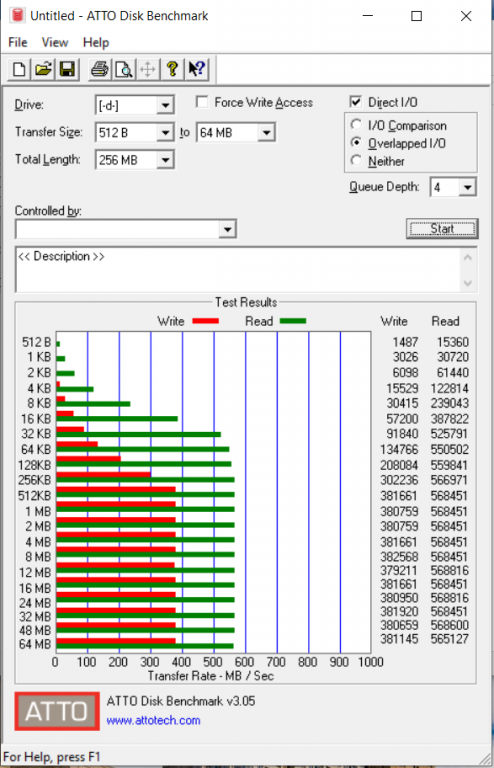ATTO Disk Benchmark is perhaps one of the oldest benchmarks going and is definitely the main staple for manufacturer performance specifications. ATTO uses RAW or compressible data and, for our benchmarks, we use a set length of 256mb and test both the read and write performance of various transfer sizes ranging from 0.5 to 8192kb. Manufacturers prefer this method of testing as it deals with raw (compressible) data rather than random (includes incompressible data) which, although more realistic, results in lower performance results.
CRYSTAL DISK BENCHMARK VER. 7.7.0 X64
Crystal Disk Benchmark is used to measure read and write performance through sampling of random data which is, for the most part, incompressible. Performance is virtually identical, regardless of data sample so we have included only that using random data samples.
THROUGHPUT
IOPS
TxBench is one of our newly discovered benchmarks that we works much the same as Crystal Diskmark, but with several other features. Advanced load benchmarking can be configured, as well as full drive information and data erasing via secure erase, enhanced secure erase, TRIM and overwriting. Simply click on the title for a free copy.
Looking at the above performance results, we can see the price of falling back to using Serial ATA, vice the all to common NVMe that we see these days. Listed performance is as stated but looking at the low 4k random reads and writes, they are much lower than we have seen in some time. To many this may not mean anything at all, unless of course you are storing operating system or very small files that must be retrieved quickly for some reason. This most likely also accounts for the 3-year warranty, vice industry standard five that we see typically these days.
FINAL THOUGHTS
All in all, the Crucial X6 is one of the most compact storage devices we have seen to date and that is its biggest benefit. It’s pricing, at the comparative level, is good…until we put it beside its bigger brother the X8. Right now at Amazon, we can purchase the faster performing X8 which also includes both Type-C adapters for $149 while the newer and smaller X6 comes in at $154 before buying the Type-C to Type-A adapter.
It’s a choice that Crucial doesn’t mind you making, the smaller X6 or the slightly larger X8 with twice the speed.
Check out Crucial X6 Pricing at Amazon.
 The SSD Review The Worlds Dedicated SSD Education and Review Resource |
The SSD Review The Worlds Dedicated SSD Education and Review Resource | 


According to reviews these units suck….WHY? Gets hot and reduces transferspeeds dramatically. Some report as SLOW as 35MB/s …LOL…. Crucial claims to check if USB-C cable are correctly connected meaning one side is slower than the other on USB-C …lol
I have no problem whatsoever with you expressing your opinion but do not make it derogatory towards the site or myself. The is the easiest way to get banned and unable to send future comments. The test results are as they are. This is a SATA SSD which means that, regardless if it is USB 3.2 or not, it is still only capable of speeds as advertised. In todays world that is slow and I stated that. Considering the tests performed, we are confident that any abnormalities such as speeds of 35MB/s would be identified. Having said that, we made not that this SSD is NOT for the transfer of OS files or small files…because the low 4K randoms are horrid. Most important thing…. Know what you need this for. If you buy this in hopes of putting all of your media on it in just a few minutes…look in the mirror for the problem.
Oh my god QLC for over $150? Why wouldn’t I buy an MX500 with a hard drive case and DIY a portal SSD
I wasn’t aware you could get a 2TB MX500, and even at the 1TB mark, you wold be hard pressed to create your own external SSD at this price. I do understand your thoughts on QLC in comparison to TLC however.